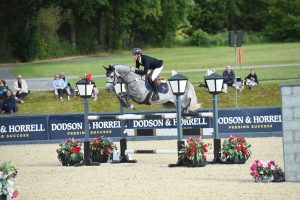4 signs that you are definitely rattled and 4 helpful tips to help you see off those butterflies.
“You’re not a rider until you have fallen off seven times”. How many of us have heard this saying?
However, each of those 7 falls can make us scared, question why we are riding at all and for some the seventh fall may well be the last time they want to fall.
Fear and horses are not a good combination.
When I was learning my pony only had to turn a corner, not even a sharp one, and off I’d slide. In fact I swear I did actually spend more time sitting on the floor than on my pony’s back. Luckily he was close to the ground and never seemed to be going at any great speed so I was lucky and falling off didn’t really phase me. As I got better and stayed on for longer periods, allowing said pony to go a bit faster and following on from him a series of ponies then horses then proper show horses, hunters & eventers and I fell off more frequently and at greater speeds and from greater heights… and then I wasn’t so laid back. Looked at from a distance the sensations could have been described as fear I don’t think I thought of them as fear but it did shock me, It did make my tummy try to jump right out of my mouth, it did make me feel sick. Shock or fear are natural reactions, they are natures way of protecting us. It was not the getting back on top that was more difficult, mostly I just jumped right back into the saddle and carried on… it was more the next time, or the time after that, sometimes for months, mostly unbidden the butterflies would suddenly rear their head and rattle me.
I don’t disagree that you are not a rider until you have fallen off seven times, but I do think that its right to acknowledge that each of them have shaken you up, dented your self confidence and can affect how you ride afterwards.
Fear is a very useful emotion, if we didn’t have any fear, we wouldn’t be able to tell if we were in danger and extreme fear is paralysing and irrational and does need to be addressed. Everyone is going to cope differently:
- You may make excuses to avoid riding, in you head its all perfectly rational, suddenly your diary is so full you just cant take the time to ride.
- You may think yes I’m fine but then faced with the same jump you freeze of you deliberately (or subconsciously) pull your horse up. You sit there kicking but hope that he wont go so you pull him back at the same time.
- Your horse starts making you very nervous. He only has to jinx or react and you over react. You just cant enjoy what you are doing and are constantly expecting the worse.
- Or you may experience extreme anxiety, where there were just little tingles in your tummy before now you almost cant breath, your heart is thumping and you are very hot.
The first step to overcoming this new fear is to stop, step back and analyse what the problem is. Calmly break it down into its component parts. Of course there are some accidents which are way beyond anything we can plan for and for these life changing events it is best to seek professional help. For the majority of us though I am talking about being dumped off a fresh horse, mis judging a fence, not concentrating and being caught out when our horse spooks.
When you break an event down into its component parts it has a calming effect, you are able to remove the emotional connection to the event.
Ask yourself what is going on in your life that may be causing you to lack concentration, or was it due to a lack of common sense. i.e. I knew Frank was fresh…I hadn’t ridden for a week” or where you tackling something new of bigger where you overconfident or did you take a risk. Sometimes thinking things through can help us understand the obvious.
Some people can bottle their worries up and carry on regardless, but they know they are pretending. They are experiencing the same fears but choosing to ignore the effect it is having on them. However this is not always the best idea. Each event does need to be acknowledged and thought through then rationalised.
April Clay the Sports Phycologist suggests the following techniques and suggestions for rebuilding your confidence:
- Take it slow: take a step back and ask a little less of yourself do what you know you can do and then when you feel confident ask yourself to step forward again.
- Build physical strength/basic skills: Increasing your physical strength can increase your confidence and your ability.
- Realign your self talk: stop saying “I know I will fall off again” and replace those thoughts with more reasonable, positive ones. Acknowledge that you are feeling anxious but think positively on how much you are progressing. Visualise yourself correcting the problem: visualise the correct way of doing/approaching. Feel in your head the movements that you need to make to achieve this. Do not use I”I must not do this or that” use the positives.
- Relaxation training: Meditation of exercises like Yoga or Tai Chi are not only great physically for your body they also help you become more self aware and therefore more able to control your mind and body together.
How you begin to build up your confidence after an accident will depend on your unique situation and your individual personality. Some of you will have higher hurdles to get over, but stepping back, analyzing, starting small and thinking positively will make all the difference to you and your horse.
Anna Clay has published a very interesting book “Training from the Neck Up: A Practical Guide to Sports Physchology for Riders or The Rider’s Edge: Overcoming the Psychological Challenges of Riding written by Janet Sasson Edgette and Tony Johnson’s Inside Your Ride: Mental Skills for Being Happy and Successful with Your Horse these books are available on Amazon and elsewhere.
Finding the right professional trainer will also be a great help. Someone who you feel at ease with and are able to properly discuss your concerns will be able to make sure you address any worries and help you along the road to becoming the confident rider you want to be.





